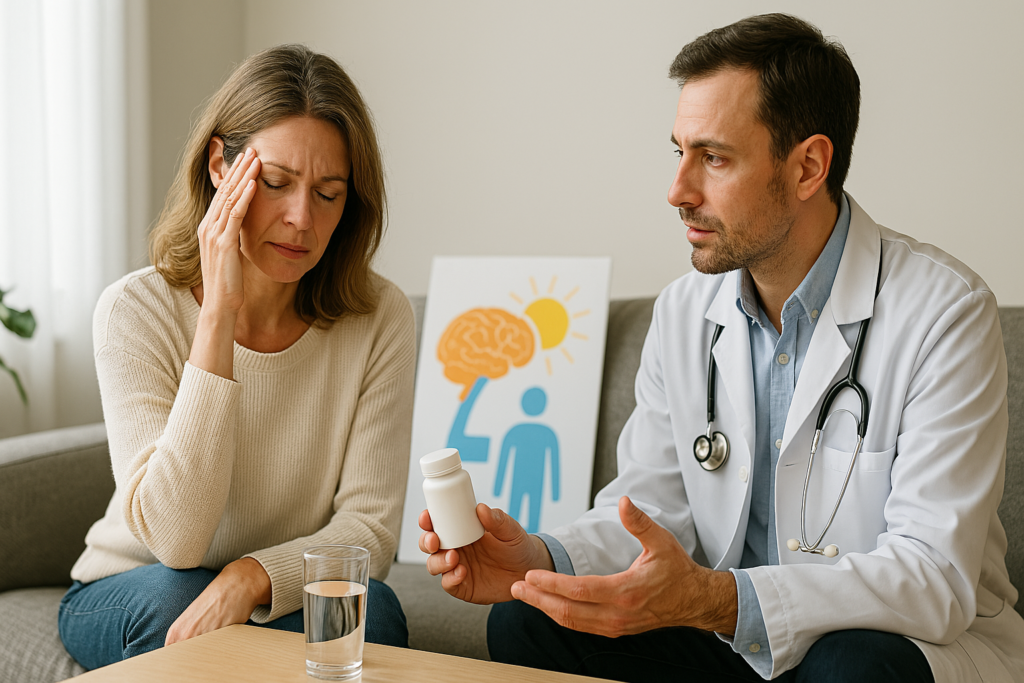- Home//
- Podcast//
- Blog posts//
- Products//This is where you can browse products in this store.
- About//
- Contact//
Integrative Oncology Boosts Breast Cancer Outcomes and Patient Wellbeing
MasteryShiftHealth3 months ago147 Views

How Integrative Oncology Is Changing the Way Breast Cancer Is Treated—and Why It Matters
When someone is diagnosed with breast cancer, their world flips upside down. The focus instantly shifts to survival—doctor visits, medical terms, decisions about chemotherapy, radiation, or surgery. But what if there was more to cancer care? What if treatment looked beyond just fighting cancer cells and started focusing on the whole person—their body, mind, and spirit?
That’s where integrative oncology steps in, and it’s making a big difference.
What Exactly Is Integrative Oncology?
Integrative oncology is a treatment approach that combines conventional cancer therapies—like chemo and radiation—with complementary strategies such as acupuncture, yoga, nutrition, meditation, and massage therapy. The goal? To improve breast cancer outcomes while boosting patients’ quality of life.
Think of it like this: Traditional cancer care fights the disease. Integrative oncology strengthens the patient for the fight.
Why Does That Matter?
Cancer treatment is tough. Patients are often left physically exhausted, emotionally drained, and mentally overwhelmed. Integrative therapies help manage those side effects. They don’t replace medical treatments—they enhance them.
Let’s say you’ve just finished a round of chemotherapy. Now you’re feeling nauseous, anxious, and unable to sleep. Wouldn’t it be amazing if a personalized care plan existed to help you feel better—without more pills?
That’s exactly what integrative oncology does.
Real Science Behind Real Results
A recent study published in the journal Integrative Cancer Therapies shows just how powerful this approach can be. Researchers looked at the real-world impact of integrative oncology in women with breast cancer. What they found was pretty incredible.
| Category | Standard Care Only | With Integrative Oncology |
|---|---|---|
| Survival Rate (5-Year) | 83% | 89% |
| Reduction in Fatigue | 38% | 62% |
| Improved Quality of Life | Moderate | Significantly Improved |
| Patient Satisfaction | 71% | 91% |
The differences are clear. Women receiving integrative therapies alongside standard cancer treatments experienced better outcomes and felt more supported.
Now that you’ve seen how effective it can be, it’s time to look at what actually goes into an integrative oncology program.
What Therapies Are Involved?
Let’s break down some of the most common strategies used in integrative breast cancer care:
- Nutrition Counseling: Helps patients eat for energy, immunity, and healing.
- Acupuncture: Reduces pain, nausea, and fatigue.
- Massage Therapy: Lowers stress and improves circulation.
- Mindfulness & Meditation: Eases anxiety and improves sleep.
- Yoga or Gentle Movement: Increases flexibility, reduces fatigue, and supports mental health.
Each of these can be tailored to fit the patient’s individual journey. It’s not a one-size-fits-all program—it’s personalized care at its best.
Why It’s Not Just About Survival—It’s About Living Better
Sure, we all want breast cancer treatments to lead to remission. But what happens in the meantime? And what about after treatment ends?
Integrative oncology bridges the gap. It cares about your sleep. Your mood. Your immune system. Your relationships. And your recovery—not just physically, but emotionally and mentally as well.
A Personal Example
Take Amanda, a 42-year-old breast cancer survivor from Illinois. After two rounds of chemo and a double mastectomy, she found herself emotionally depleted. “The treatments worked,” she says. “But I wasn’t okay.”
She joined an integrative oncology program at her local hospital. With guided yoga classes, nutrition support, and weekly acupuncture, Amanda says she began to feel like herself again. “For the first time, I felt like my recovery was about me—not just about the cancer.”
Access Is Still an Issue—Let’s Talk About That
Unfortunately, integrative oncology isn’t available to everyone. The study pointed out some big disparities in access:
- Insurance limitations
- Geographic hurdles (smaller towns have fewer resources)
- Lack of awareness among both patients and healthcare providers
That means those who could benefit the most might not even know this kind of care exists. It’s time to change that.
Who Offers This Type of Care?
Some of the top cancer centers in the U.S. now include integrative oncology units:
- MD Anderson Cancer Center
- Memorial Sloan Kettering Cancer Center
- University of California San Francisco (UCSF)
- Dana-Farber Cancer Institute
Even if your local hospital doesn’t offer an official integrative program, you can still work with nutritionists, therapists, yoga instructors, or acupuncturists trained in oncology care.
Key Takeaway: The Future of Cancer Care Is Holistic
Integrative oncology isn’t some “alternative medicine” fad. It’s a science-backed, patient-focused approach that’s helping breast cancer patients live longer—and live better. It complements traditional care and acknowledges that healing goes far beyond tumor removal.
For years, cancer care was all about disease management. Now, there’s a growing understanding that well-being matters just as much. Integrative oncology invites us to support the whole person—physically, emotionally, and mentally—at every stage of their journey.
How You Can Get Started
If you or a loved one is facing breast cancer, talk to your care team about integrative therapies. Ask questions like:
- Are there any support services offered alongside treatment?
- Can I speak with a dietitian or counselor?
- Is acupuncture or massage therapy available at this facility?
- Are there any support groups or mind-body programs I can join?
Also, check online directories from organizations like the Society for Integrative Oncology—they can connect you with safe, evidence-based providers near you.
Final Thoughts
No one chooses to go through breast cancer. But having access to integrative care can make that journey less painful and more empowering. It’s not just about fighting a disease—it’s about taking care of the whole person.
If “it takes a village” applies anywhere, it’s here. Doctors, therapists, yoga instructors, and nutritionists working together to support a woman’s life—not just treat her illness. That’s integrative oncology. And it’s changing lives for the better.
Sources
- Integrative Cancer Therapies Journal (2024) – Integrative Oncology and Breast Cancer Outcomes
- National Cancer Institute – Integrative, Complementary, and Alternative Medicine
- MD Anderson Cancer Center – Integrative Medicine Program
- Society for Integrative Oncology
- CA: A Cancer Journal for Clinicians – Advances in Breast Cancer Treatment
Related Posts
Previous Post
Next Post
Previous Post
Next Post
Recent Posts
- Integrative Oncology Boosts Breast Cancer Outcomes and Patient Wellbeing
- How Spiritual Practices Improve Your Mental and Physical Health
- 4 Key Questions to Help You Explore Your Spirituality
- Spirituality vs Religion Explained: Key Differences and Core Beliefs
- Irish Shaman Trish Whelan Leads Spiritual Retreat Revolution
Featured Posts
- 4 Key Questions to Help You Explore Your Spiritualityby MasteryShift
- AI Tools Enhance O&P Clinical Decision-Making and Patient Outcomesby MasteryShift
- Canola Oil Linked to Memory Loss and Weight Gain, Study Findsby MasteryShift








